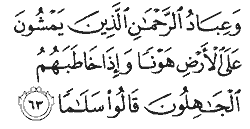Living The Quran
From Issue: 679 [Read full issue]
Irascibility
Al Furqan (The Criterion) - Chapter 25: Verse 63
 "For true servants of the Most Gracious are they who walk gently on the earth, and who, whenever the jahilun address them, reply 'Peace' (salam)."
"For true servants of the Most Gracious are they who walk gently on the earth, and who, whenever the jahilun address them, reply 'Peace' (salam)."
Muslims have traditionally used jahiliyyah to refer to the pre-Islamic period in Arabia and so it is usually translated "the Time of Ignorance." But although the root J-H-L has some connotations of "ignorance," its primary meaning is "irascibility": an acute sensitivity to honour and prestige; arrogance, excess, and above all, a chronic tendency to violence and retaliation. Jahili people were too proud to make the surrender of Islam; why should a karim moderate his behaviour and act like a slave ('abd), praying with his nose on the ground and treating the base-born like equals? The Muslims called Abul Hakim, their chief enemy, "Abu Jahl" not because he was ignorant of Islam - he understood it all too well - but because he fought Islam arrogantly, with blind, fierce, and reckless passion. But the tribal ethos was so engrained that Muslims continued to exhibit jahili symptoms long after they had converted to Islam. Jahiliyyah could not be eradicated overnight, and it remained a latent menace, ready to flare up destructively at any moment.
Instead of succumbing to the jahili spirit, the Quran urges Muslims to behave with hilm, a traditional Arab virtue. Men and women of hilm were forbearing, patient, and merciful. They could control their anger and remain calm in the most difficult circumstances instead of exploding with rage; they were slow to retaliate; they did not hit back when they suffered injury, but left revenge to Allah. Hilm also inspired positive action: if they practiced hilm, Muslims would look after the weak and disadvantaged, liberate their slaves, counsel each other to patience and compassion, and feed the destitute, even when they were hungry themselves. Muslims must always behave with consummate gentleness and courtesy. They were men and women of peace.
Compiled From:
"Muhammad: A Prophet for Our Time" - Karen Armstrong, pp. 79, 80